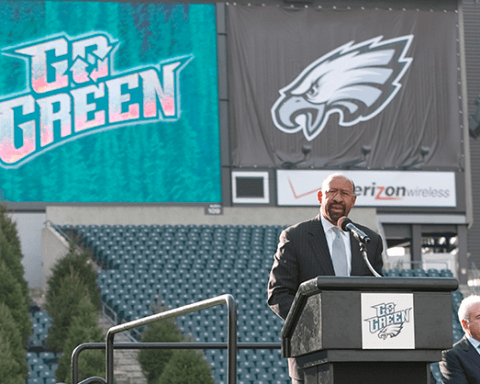A list of 38 specific policies and programs was assembled from analysis of what cities around America have been doing to try to become more sustainable (see below). Each of the 54 largest U.S. cities, plus Pittsburgh, Penn., was assessed to see which of these programs it has adopted and implemented. Cities received one point for each adopted/implemented program. The total number of points received determines a city’s final ranking. City websites and web-based materials, as well as recently conducted surveys of local officials, were used to confirm that programs were indeed being implemented. Assessment of changes in sustainability programs is especially challenging because cities rarely explicitly eliminate previously adopted programs. Instead, they may opt to de-emphasize, modify or de-fund them without any announcement. For the period between 2011 and 2012 we were unable to identify any sustainability-related program in any city that had been repealed or canceled.
Project lead: Jeremy Runnalls
Researcher: Kent E. Portney is a professor of political science at Tufts University in Medford, Mass.
The City Policies, Programs and Activities assessed in the Rankings:
Smart Growth Activities
1. Eco-industrial park development
2. Targeted or cluster economic development
3. Eco-village (urban infill housing) project or program
4. Brownfield redevelopment (project or pilot project)
Land-Use Planning Programs, Policies and Zoning
5. Zoning used to delineate environmentally sensitive growth areas
6. Comprehensive land-use plan that includes environmental issues
7. Tax incentives for environmentally friendly development (other than energy efficiency counted elsewhere)
Transportation Planning Programs and Policies
8. Operation or sponsorship of public transit (buses and/or trains)
9. Limits on downtown parking spaces
10. Car pool lanes on city streets (high occupancy vehicle or diamond lanes)
11. Alternatively fueled city vehicle (green fleet) program
12. Bicycle ridership program
Pollution Prevention, Reduction and Remediation
13. Household solid waste recycling
14. Industrial recycling
15. Hazardous waste recycling
16. Air pollution reduction program (e.g., reduction in volatile organic compounds)
17. Recycled product purchasing by city government
18. Superfund (non-brownfield) site remediation
19. Asbestos abatement program
20. Lead paint abatement program
21. Pesticide reduction program
22. Urban garden/sustainable food system or agriculture program
23. Heat island mitigation program (other than green roofs)
Energy and Resource Conservation/Efficiency
24. Green building program
25. Green affordable/low income housing program
26. Renewable energy use by city government
27. Energy conservation/efficiency incentives or rebate program (other than green building program)
28. Alternative energy offered to consumers (solar, wind, biogas, etc.)
29. Water conservation program
Sustainable Indicators Project
30. Sustainable indicators project active in last five years
31. Indicators progress report in last five years
32. Does indicators project include “action plan” for policies/programs?
Organization/Administration/Management/Coordination/Governance
33. Single government agency, office or person responsible for implementing sustainability programs
34. Sustainability an explicit part of a citywide comprehensive or general plan
35. Involvement of county government or metropolitan council
36. Involvement of mayor or chief executive officer
37. Involvement of business community (e.g., chamber of commerce, sustainable business organization)
38. General public involvement (public hearings, visioning process, neighborhood groups or associations, etc.)
Corporate Knights Notice and Disclaimer
This document and all of the information contained in it, including without limitation all text, data, graphs, charts (collectively, the “Information”) is the property of Corporate Knights Inc. known herein as “Corporate Knights” and is provided for informational purposes only. The Information may not be modified, reverse-engineered, reproduced or redisseminated in whole or in part without prior written permission from Corporate Knights.
The Information may not be used to create indexes, databases, risk models, analytics, software, or in connection with the issuing, offering, sponsoring, managing or marketing of any securities, portfolios, financial products or other investment vehicles utilizing or based on, linked to, tracking or otherwise derived from the Information or any other Corporate Knights data, information, products or services.
The user of the Information assumes the entire risk of any use it may make or permit to be made of the Information. CORPORATE KNIGHTS DOES NOT MAKE ANY EXPRESS OR IMPLIED WARRANTIES OR REPRESENTATIONS WITH RESPECT TO THE INFORMATION (OR THE RESULTS TO BE OBTAINED BY THE USE THEREOF).
Information containing any historical information, data or analysis should not be taken as an indication or guarantee of any future performance, analysis, forecast or prediction. Past performance does not guarantee future results.
None of the Information constitutes an offer to sell (or a solicitation of an offer to buy), any security, financial product or other investment vehicle or any trading strategy.
The Information may contain back tested data. Back-tested performance is not actual performance, but is hypothetical. There are frequently material differences between back tested performance results and actual results subsequently achieved by any investment strategy.
Constituents of Corporate Knights equity indexes or stock lists are listed companies, which are included in or excluded from the indexes or lists according to the application of the relevant methodologies. Accordingly, constituents in Corporate Knights equity indexes or lists may include Corporate Knights, clients of Corporate Knights or suppliers to Corporate Knights. Inclusion of a security within a Corporate Knights index or list is not a recommendation by Corporate Knights to buy, sell, or hold such security, nor is it considered to be investment advice.
Corporate Knights receives compensation in connection with licensing its indexes to third parties. Corporate Knights Inc.’s revenue includes fees based on assets in Index Linked Investments.
Any use of or access to products, services or information of Corporate Knights requires a license from Corporate Knights. Corporate Knights brands and product names are the trademarks, service marks, or registered trademarks of Corporate Knights and its subsidiaries in Canada, United States and other jurisdictions.
Click here to go back to the ranking landing page.







